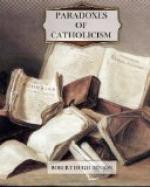Now the attitude of the Catholic Church towards Death is not only the most violent reversal of the world’s policy, but the most paradoxical, too, of all her methods. For, while the world attempts to keep Death at arm’s length, the Church strives to embrace him. Where the world draws his sword to meet Death’s assault, the Church spreads her heart only to receive it. She is in love with Death, she pursues him, honours him, extols Him. She places over her altars not a Risen Christ, but a dying One.
If thou wilt be perfect, she cries to the individual soul, give up all that thou hast and follow me. “Give up all that makes life worth living, strip thyself of every advantage that sustains thy life, of all that makes thee effective.” It is this that is her supreme appeal, not indeed uttered, with all its corollaries, to all her children, but to those only that desire perfection. Yet to all, in a sense, the appeal is there. Die daily, die to self, mortify, yield, give in. If any man will save his life, he must lose it.
So too, in her dealings with society, is her policy judged suicidal by a world that is in love with its own kind of life. It is suicidal, cries that world, to relinquish in France all on which the temporal life of the Church depends; for how can that society survive which renounces the very means of existence? It is suicidal to demand the virgin life of the noblest of her children, suicidal to desert the monarchical cause of one country, and to set herself in opposition to the Republican ideals of another. For even she, after all, is human and must conform to human conditions. Even she, however august her claims, must make terms with the world if she desires to live in it.
And this comment has been made upon her actions in every age. She condemned Arius, when a little compromise might surely have been found; and lost half her children. She condemned Luther and lost Germany; Elizabeth, and lost England. At every crisis she has made the wrong choice, she has yielded when she should have resisted, resisted when she should have yielded. The wonder is that she survives at all.
Yes, that is the wonder. As dying, behold she lives!
II. The answer of course is easy. It is that she simply does not desire the kind of life which the world reckons alone to be life. To her that is not life at all. She desires of course to survive as a human society, and she is assured that she always shall so survive. Yet it is not on the ordinary terms of ordinary society that she desires survival. It is not a natural life of which she is ambitious, a life that draws its strength from human conditions and human environment, a life, therefore, that waxes and wanes with those human conditions and ultimately meets their fate, but a supernatural life that draws its strength from God. And she recognizes, as one of the most fundamental paradoxes of all, that such a life can be gained and held only through what the world calls “death.”




